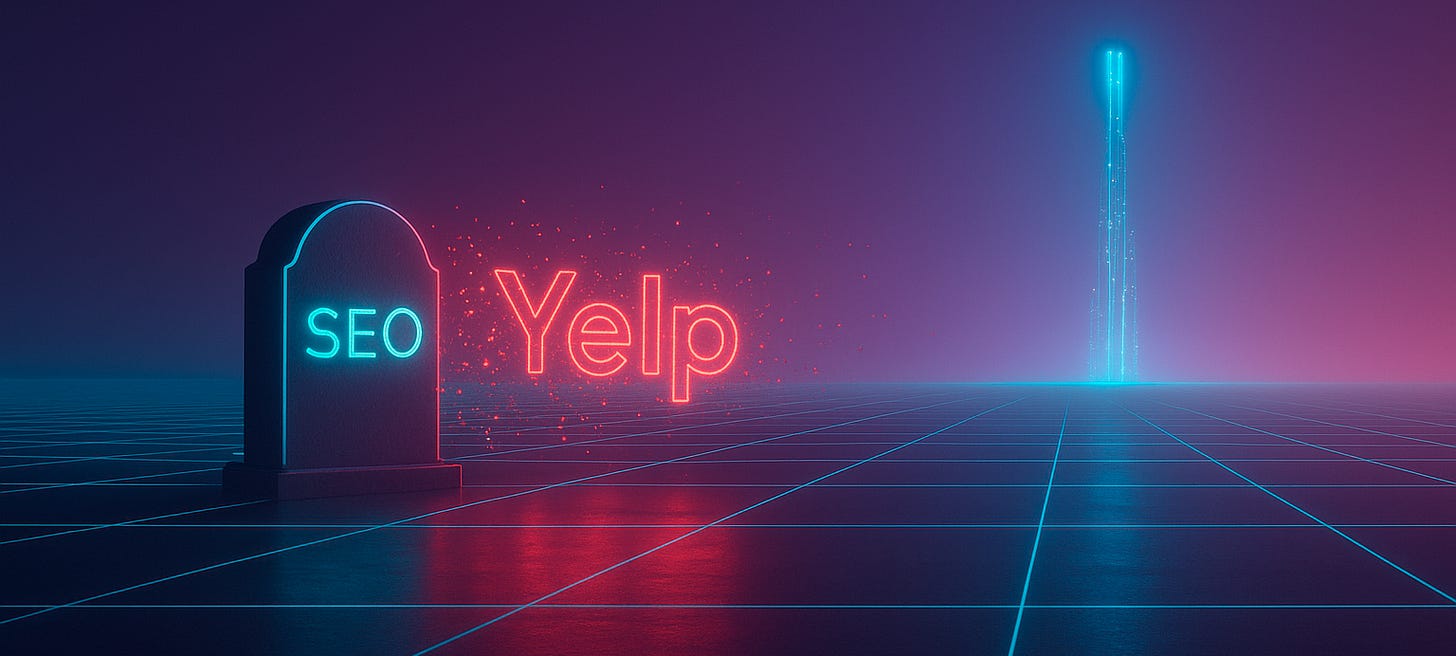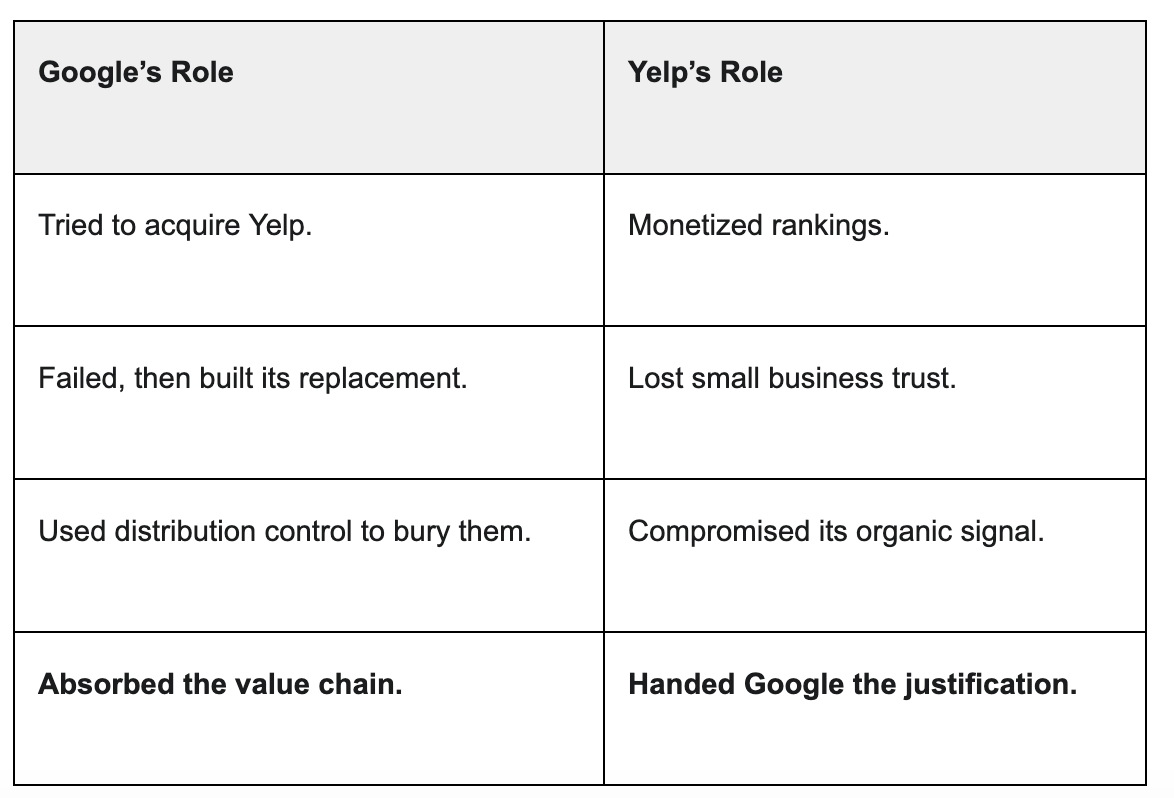Why Google Killed Yelp’s SEO — And How Yelp Helped It Happen
For nearly two decades, one of the most consequential battles in tech has been the quiet war between Google and Yelp. For anyone tracking search, local commerce, or the evolution of online reviews, this story has been part antitrust drama, part SEO experiment, and part street-corner rumor in every major city.
With Yelp filing antitrust lawsuits in 2024, the final chapters are being written. But to understand how we arrived at this moment—and why both companies share the blame—we have to rewind.
The Rise: 2004–2010
Yelp launched in 2004 and quickly became the trusted source for local business discovery:
“Best sushi near me”
“Top hair salons NYC”
“Best Indian food in New Jersey”
If you searched anything like this between 2004 and 2010, Yelp was at the top. The process was a reflex: Google the category, click Yelp, choose the place. Yelp wasn’t just winning; it defined local search culture.
Crucially, Google tried to buy Yelp during this period. When that failed, the tone of the relationship changed forever.
The Strategic Turn: 2011
In 2011, Google made its move:
It acquired Zagat.
It launched and expanded Google Places → Google My Business → Google Maps reviews.
It began surfacing reviews directly inside search results.
At first, the industry assumed fair competition: Yelp had the brand and content advantage; Google had distribution and infrastructure. For a few years, rankings bounced back and forth. Then the ground shifted.
The Quiet Collapse: 2017
By 2017, SEO experts started noticing something dramatic: Yelp wasn’t just dropping a few spots—it was disappearing.
Page one turned into page four.
Page four turned into page ten.
This wasn’t algorithmic drift; that was algorithmic intent. Traffic fell. Discoverability collapsed. And the industry began whispering what seemed obvious: “Google is burying Yelp.”
Wall Street Wakes Up: 2018
In 2018, Yelp missed revenue expectations. The consequences of lost SEO were tangible: less organic traffic, fewer advertisers, declining consumer engagement, and slowing new business acquisition.
The stock plunged. Yelp tried UI changes, policy changes, and product changes—nothing lifted rankings. The internet crowned the narrative: “Yelp is dying.” When users notice you’ve disappeared from Google search, the battle is already lost.
2024: Yelp Files Antitrust Suits
Two decades after dominating local discovery, Yelp is now suing Google, asserting that:
Google systematically buried Yelp.
Google self-preferenced its own products.
Search neutrality was compromised.
And they are right. Google did kill Yelp’s SEO. The bullseye was real.
But here is the part Yelp won’t say—and the nuance most coverage misses: Yelp helped create the opening.
The Part Yelp Doesn’t Like to Talk About
In the early 2010s, a complaint became common among local business owners:
“A Yelp rep shows up, tries to sell me ads, and implies my reviews will be better if I pay—or worse if I don’t.”
One hairstylist joked, “Twenty years ago the mafia shook me down. Now it’s Yelp.” It was a joke that stopped being funny after hearing it from twenty different businesses.
Businesses preferred Google reviews because:
You could dispute malicious reviews.
There was an appeals process.
Moderation felt fairer.
Meanwhile, Yelp began to look like pay-to-play visibility. When a ranking system becomes financially biased, it stops being a trusted signal. And Google saw it.
So while the antitrust case focuses on market power and self-preferencing, the algorithmic truth is simpler: Yelp’s review ecosystem became commercially influenced—and that gave Google the moral and algorithmic cover to crush them.
This pattern is similar to what happened with paid blogs and link-buying networks. Once authenticity breaks, the algorithm doesn’t just adjust—it punishes. For Yelp, that punishment was existential.
So Who’s Right? Both.
This wasn’t a clean antitrust narrative. It was competition, retaliation, and algorithmic ethics intersecting.
The Bigger Lesson — For Everyone in Content and SEO
This wasn’t just about restaurants. It was the first big example of a coming era where:
Distribution platforms internalize the value chain.
Links lose power as answers replace listings.
Platforms decide who gets visibility.
Fairness becomes narrative, not guarantee.
Sound like where AI is headed? Yelp wasn’t just a casualty; it was the prototype.
We are now entering the AIO era—AI Optimization—where success isn’t about ranking in a list of links, but being selected inside an AI-driven answer engine. Google vs. Yelp wasn’t the end of SEO. It was the warning that ranking power can move—suddenly and permanently—when trust, competition, and platform ambition collide.
Final Thought
Yelp didn’t lose because it was a bad product. Yelp lost because it stopped being pure—and the platform that controlled discovery wanted the category. Call it antitrust. Call it evolution. Call it a lesson in platform risk. But make no mistake: Google killed Yelp’s SEO — and Yelp helped load the gun.
In the AI era, every publisher, brand, and content creator should take note: If you don’t stay as a trusted source of information and content, you don’t control your destiny.




